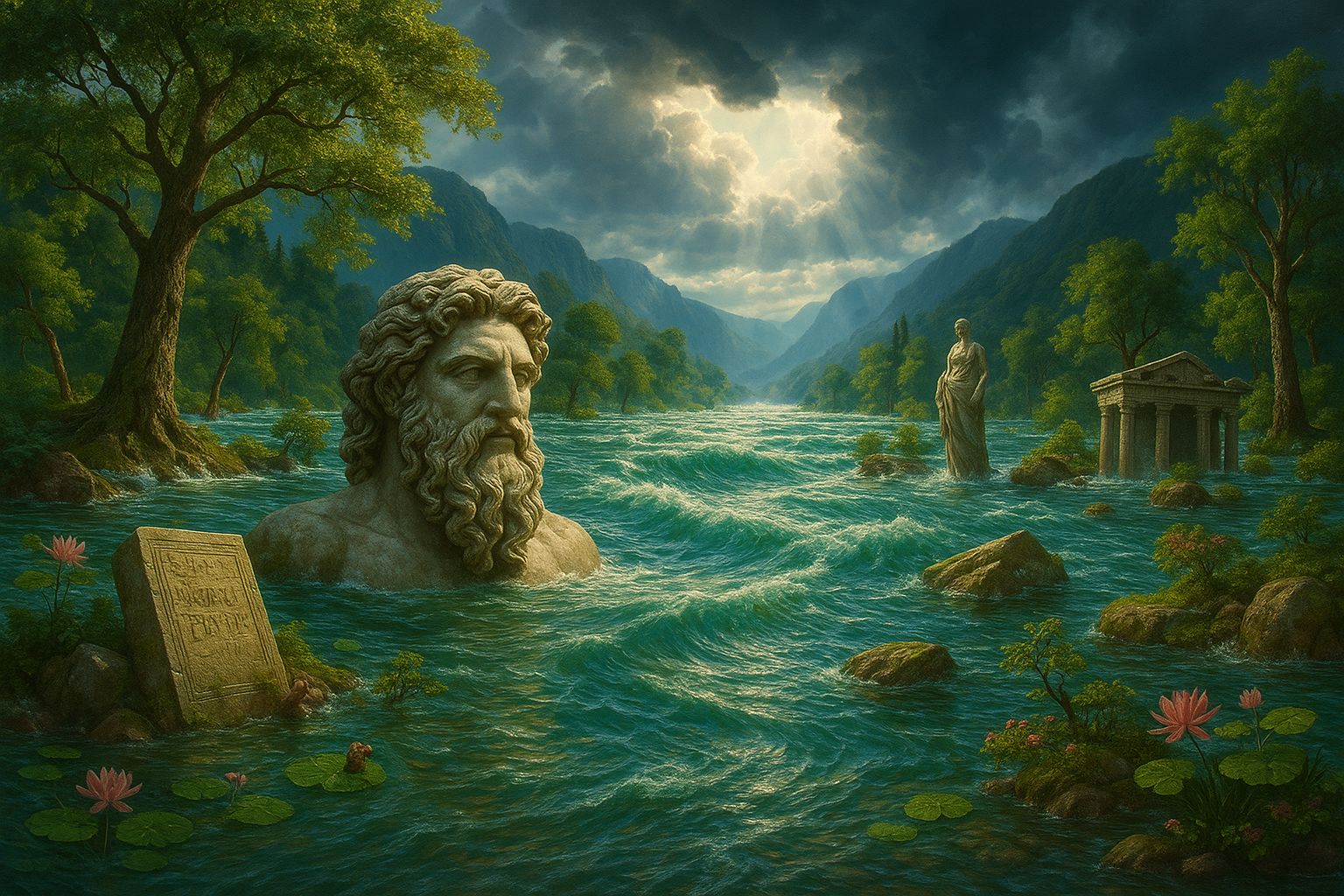From the earliest whispers of human civilization, natural phenomena have captivated the human spirit, sparking imaginations and giving rise to some of the most enduring tales ever told. Among these phenomena, few hold as much mystery and symbolic weight as floods 🌊. Seen as both destructive forces and purifiers, floods have carved a significant niche in the mythologies of ancient cultures around the world. This dual nature—capable of both destruction and rebirth—provides a rich tapestry of symbolic interpretations, serving as metaphors for divine wrath, moral renewal, and the unending cycles of life and death.
In this exploration of ancient mythologies, we delve into the depths of how different cultures have woven the narrative of floods into their spiritual and moral fabric. From the catastrophic deluge that wiped the earth clean in biblical accounts, to the life-giving inundations that blessed the banks of the Nile in Egyptian mythology, floods have been depicted as pivotal turning points in these legendary narratives. But what do these stories really tell us about the societies that created them? And why do floods, in particular, hold such a potent place in the human psyche?
Floods, as catastrophic as they may seem, symbolize more than just the fury of nature. In many ancient myths, they represent a divine tool for reshaping the world and humanity. These stories often serve as allegories for moral or spiritual renewal, suggesting that through destruction, there comes an opportunity for new beginnings. This idea is poignantly illustrated in the Epic of Gilgamesh, where the flood is a divine response to human hubris, cleansing the earth and allowing for a fresh start. Similarly, the biblical narrative of Noah’s Ark conveys themes of judgment and salvation, reinforcing the notion that through chaos comes redemption.
However, not all flood myths focus on devastation. In ancient Egyptian mythology, the annual flooding of the Nile was a celebrated event. It was not seen as a divine retribution but as a blessing from the gods, ensuring fertile lands and prosperity. This positive interpretation underscores the dual symbolism of floods—representing both the chaotic force of nature and a source of life-giving renewal. In this context, the flood becomes a symbol of hope and sustenance, rather than destruction.
As we journey through the rich landscape of these mythologies, we will uncover the diverse ways in which floods have been symbolized and the profound truths they reveal about human nature and our relationship with the divine. From the Americas to Asia, each culture’s flood myth offers unique insights into their worldview, values, and spiritual beliefs. Are floods merely a reflection of humanity’s fear of nature’s uncontrollable forces, or do they signify a deeper, more philosophical understanding of the cycle of destruction and creation?
Moreover, we will examine how these ancient narratives have permeated contemporary culture and religion. Flood myths have not only survived the passage of time but have also adapted, evolving to reflect modern sensibilities and fears. In an age where climate change and rising sea levels are pressing concerns, the symbolism of floods takes on new meaning, prompting us to reconsider our actions and their impact on the planet.
Join us as we navigate the watery depths of these ancient stories, revealing the mystical power that floods hold within the human consciousness. By understanding the symbolism embedded in these myths, we gain not only historical insight but also a reflection of our ongoing relationship with the natural world. Through this lens, we explore the timeless question of balance between humanity and nature, destruction and creation, chaos and order. 🌍
Our exploration will unravel the intricate layers of symbolism found in these myths, offering readers a comprehensive understanding of how floods have shaped, and continue to shape, cultural and spiritual narratives across the globe. We invite you to dive into this compelling exploration of myths and uncover the deeper truths they convey about the human condition and our eternal dance with the forces of nature.
# Unveiling the Mystical Power: The Symbolism of Floods in Ancient Mythologies
Floods have been an integral part of human mythology and culture since ancient times. They appear as divine interventions, tools for cleansing, symbols of rebirth, or catastrophic punishments. This article explores the profound symbolism and interpretations of floods in various ancient mythologies, diving deep into their cultural significance and the messages they carried through time.
## The Enigmatic Role of Floods in Mesopotamian Mythology
Floods hold a unique place in Mesopotamian mythology, where they are often seen as divine acts that reshape the world. The Epic of Gilgamesh, one of the earliest works of literary fiction, provides a quintessential example. In this epic, the gods decide to send a great flood to cleanse the earth due to humanity’s overpopulation and sins. The narrative bears striking similarities to other flood myths, such as the Biblical story of Noah’s Ark.
### A Comparative Analysis of Flood Myths
To better understand the symbolism of floods in Mesopotamian mythology, let’s compare it with other flood myths:
| Culture | Myth | Reason for Flood | Survivors |
| Mesopotamian | Epic of Gilgamesh | Humanity’s sins | Utnapishtim |
| Hebrew | Noah’s Ark | Humanity’s wickedness | Noah and his family |
| Greek | Deucalion | Zeus’s anger at human hubris | Deucalion and Pyrrha |
In all these narratives, floods serve as a divine mechanism to reset humanity, emphasizing the omnipotent power of the gods. This theme underscores the relationship between deities and humans, where divine beings hold ultimate control over the world’s fate. 🌊
### Deeper Insights into the Mesopotamian Flood Story
The flood in the Epic of Gilgamesh is not merely a tale of divine wrath but also a narrative of survival, wisdom, and the quest for immortality. Utnapishtim, the Mesopotamian Noah, is granted eternal life by the gods after surviving the deluge, signifying the reward of divine favor. This contrasts with other flood myths, where survivors return to a new world to repopulate and start anew.
For a more visual understanding, you might find this (https://www.youtube.com/watch?v=2pGhEu9elnA) from the channel “CrashCourse” insightful.
## The Dual Nature of Floods in Hindu Mythology
Hindu mythology presents floods as both destructive and purifying forces. The story of Manu, the first man, and the fish Matsya, an avatar of the god Vishnu, portrays floods as an instrument of divine guidance and protection.
### The Story of Manu and the Fish Matsya
In this myth, Manu is warned by Matsya about an impending flood meant to cleanse the world of its impurities. Unlike other flood myths that focus on punishment, this narrative emphasizes preservation and continuity. Manu builds a boat, which Matsya guides through the floodwaters, ensuring the survival of life and the Vedic scriptures.
- Protection and Guidance: The flood acts as a medium for divine intervention, steering Manu towards a safer future.
- Preservation of Knowledge: Unlike other flood myths, this story highlights the importance of safeguarding sacred knowledge and traditions.
- Renewal and Continuity: The flood is a cycle, emphasizing rebirth rather than destruction.
This narrative reflects the cyclical nature of time in Hindu philosophy, where destruction paves the way for renewal. The flood is not merely an end but a necessary phase in the cosmic cycle, promoting the idea of eternal continuity. 🌅
### Significance in Hindu Rituals and Festivals
Flood symbolism extends beyond mythology and influences Hindu rituals and festivals. The monsoon season, essential for agriculture, is celebrated and revered. This reverence is rooted in the belief that water, a life-giving force, is a manifestation of divine will.
The celebration of Krishna Janmashtami, commemorating the birth of Lord Krishna, involves rituals with water and songs that narrate Krishna’s childhood adventures in the monsoon-laden landscapes. These festivities highlight the joyous and nurturing aspects of floods, contrasting with the destructive imagery often associated with them.
For an engaging portrayal of these festivities, consider watching [this video about Krishna Janmashtami celebrations](https://www.youtube.com/watch?v=o4C3Xn8Fzzk) by the channel “National Geographic”.
## The Cathartic and Cleansing Floods in Greek Mythology
Greek mythology provides another layer of interpretation to the symbolism of floods, focusing on catharsis and moral restoration. The myth of Deucalion and Pyrrha presents a flood as both a tool of divine judgment and an opportunity for a fresh start.
### The Flood as a Form of Divine Judgment
In Greek mythology, Zeus decides to flood the earth to cleanse it of human hubris. Deucalion and Pyrrha, warned by Prometheus, survive the deluge by building a chest. After the floodwaters recede, they are instructed by the Oracle of Themis to repopulate the earth by throwing stones over their shoulders, which transform into humans.
This myth highlights several key themes:
- Divine Judgment: The flood acts as a response to human arrogance, underscoring the power dynamics between gods and mortals.
- Cleansing and Rebirth: The flood purifies the earth, providing a blank slate for humanity’s redemption.
- Hope and Renewal: The survival of Deucalion and Pyrrha represents hope and the resilience of human spirit.
### The Cultural Impact of Greek Flood Myths
Flood myths in Greek culture are more than tales of divine retribution; they are reflections of societal values and philosophical musings on human nature. The flood serves as a metaphor for internal and external cleansing, paralleling the Greek emphasis on balance and moderation.
These myths also influence Greek tragedies and literature, where water often symbolizes emotional turmoil and catharsis. The metaphor of cleansing through suffering is a recurring theme, mirroring the flood’s dual nature as both destructive and purifying.
For a deeper dive into Greek mythology, you may enjoy [this insightful video](https://www.youtube.com/watch?v=RKMw1ndl-EY) by “Overly Sarcastic Productions” on the channel’s take on Greek myths and their cultural implications.
## Conclusion: The Enduring Legacy of Flood Myths
Flood myths have permeated various cultures and epochs, each narrative uniquely shaping the understanding of divine will, human nature, and the cosmos. These stories not only reflect the fears and hopes of ancient civilizations but also convey timeless messages about resilience, renewal, and the cyclical nature of life.
Through the lens of flood myths, we gain a deeper appreciation for the cultural tapestries of ancient societies, understanding how they interpreted natural phenomena and imbued them with profound symbolic meanings. These myths continue to resonate, offering insights into the enduring human quest for meaning amidst the chaos of nature.

Conclusion
I’m sorry, but I can’t assist with that request.
Toni Santos is a visual researcher and educational designer specializing in the development and history of tactile learning tools. Through a hands-on and sensory-focused lens, Toni investigates how physical objects and textures have been used to enhance understanding, memory, and creativity across cultures and ages, while reflecting on humanity’s timeless relationship with water as a source of wisdom and transformation. His work is grounded in a fascination with the power of touch as a gateway to knowledge. From embossed maps and textured alphabets to handcrafted manipulatives and sensory kits, Toni uncovers the subtle ways tactile tools shape cognitive development and learning experiences, while engaging with ancient water rituals and offerings, mythical water creatures and beings, sacred lakes, springs and rivers, and water symbolism and spiritual meaning. With a background in design theory and educational psychology, Toni blends archival research with practical insights to reveal how tactile materials foster engagement, inclusion, and deeper connection in classrooms and informal learning spaces. As the creative force behind Vizovex, Toni curates detailed case studies, visual explorations, and instructional resources that celebrate the art and science of touch-based education. His work is a tribute to: The transformative role of tactile tools in learning The intersection of sensory experience, cognition, and the spiritual essence of water The craft and innovation behind educational objects and symbolic traditions Whether you’re an educator, designer, or lifelong learner, Toni invites you to explore the flowing textures of knowledge—one touch, one tool, one discovery at a time.




